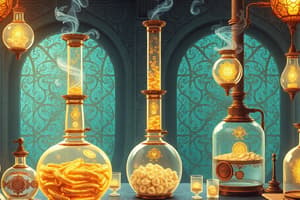Podcast
Questions and Answers
Why are chemical separation methods important in analytical chemistry?
Why are chemical separation methods important in analytical chemistry?
They prevent interference during chemical analysis and facilitate quantitative analyses to determine concentration.
What are chemical separation techniques primarily used for?
What are chemical separation techniques primarily used for?
They are used to obtain materials in a pure form and to identify the nature of those materials.
How does the difference in physical or chemical properties affect the separation process?
How does the difference in physical or chemical properties affect the separation process?
The greater the difference in properties, the easier the separation process becomes.
In what scenario is simple distillation particularly effective?
In what scenario is simple distillation particularly effective?
What are the two main processes occurring during distillation?
What are the two main processes occurring during distillation?
What is one function of the condenser in a distillation apparatus?
What is one function of the condenser in a distillation apparatus?
What role does distillation play in the purification of liquids?
What role does distillation play in the purification of liquids?
Name two physical or chemical properties that can be utilized in separation techniques.
Name two physical or chemical properties that can be utilized in separation techniques.
Why is it necessary to obtain pure materials before performing spectral tests?
Why is it necessary to obtain pure materials before performing spectral tests?
What is the relationship between quantitative analysis and chemical separation?
What is the relationship between quantitative analysis and chemical separation?
Flashcards are hidden until you start studying
Study Notes
Chemical Separation Techniques
- Crucial for obtaining pure materials and identifying their nature.
- Enable conducting further tests like spectral analysis and quantitative analysis.
- Prevent interference during chemical analysis.
- Relies on differences in physical or chemical properties, including:
- Solubility
- Fractional Dissolution
- Adsorption
- Boiling and Melting Points
- Ion Exchange
- Particle Size
Distillation
- Process of converting a liquid to a vapor, then condensing the vapor back to a liquid.
- Used for purifying liquids and separating liquids based on their boiling points.
- Involves two simultaneous processes:
- Evaporation: Heating the liquid to its vaporization point
- Condensation: Cooling the vapor to return it to a liquid state
Simple Distillation
- Used for:
- Purifying liquids from non-volatile solids
- Separating liquids with a boiling point difference greater than 50°C
- Measuring the actual boiling point of a liquid
Studying That Suits You
Use AI to generate personalized quizzes and flashcards to suit your learning preferences.




